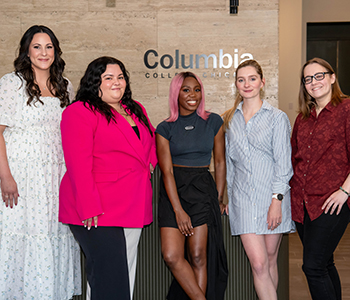
School of Audio and MusicMusic Technology Bachelor's Degree
- BS

Explore the science of sound. Columbia College Chicago’s Music Technology BS program delves into how music technology can be designed, used, and transformed for live performances, video games, sound installations, and more. You won't just operate tools; you'll design and manipulate cutting-edge technology that shapes the future of music.
Examples of Music Technology Careers
The Student Experience
Columbia’s bachelor of science degree in Music Technology goes beyond the basics, incorporating essential STEM (science, technology, engineering, and math) coursework to ensure you truly understand the scientific concepts behind the music technology you’ll be designing and creating. Get ready to blend creativity with cutting-edge technology and make your mark in the music world.
We have a number of creative spaces equipped with industry-standard software and technology.

Career Readiness
Graduates of the Music Technology program are equipped to pursue diverse careers as multimedia artists, sound designers, UX designers, and more. The program also lays a strong foundation for those interested in graduate studies in music technology or computer science.
Work with our Career Center to secure internships that align with your interests and professional goals.
Our Alumni Network is here to connect you to key people to support and guide you throughout your career.
ALumni Spotlight

24 in 2024
"24 in 2024" recognizes alumni from Columbia College Chicago for their professional achievements beyond their academic journeys. Learn more.
of 2023 grads are employed, enrolled in continued education, or pursuing their creative practice.